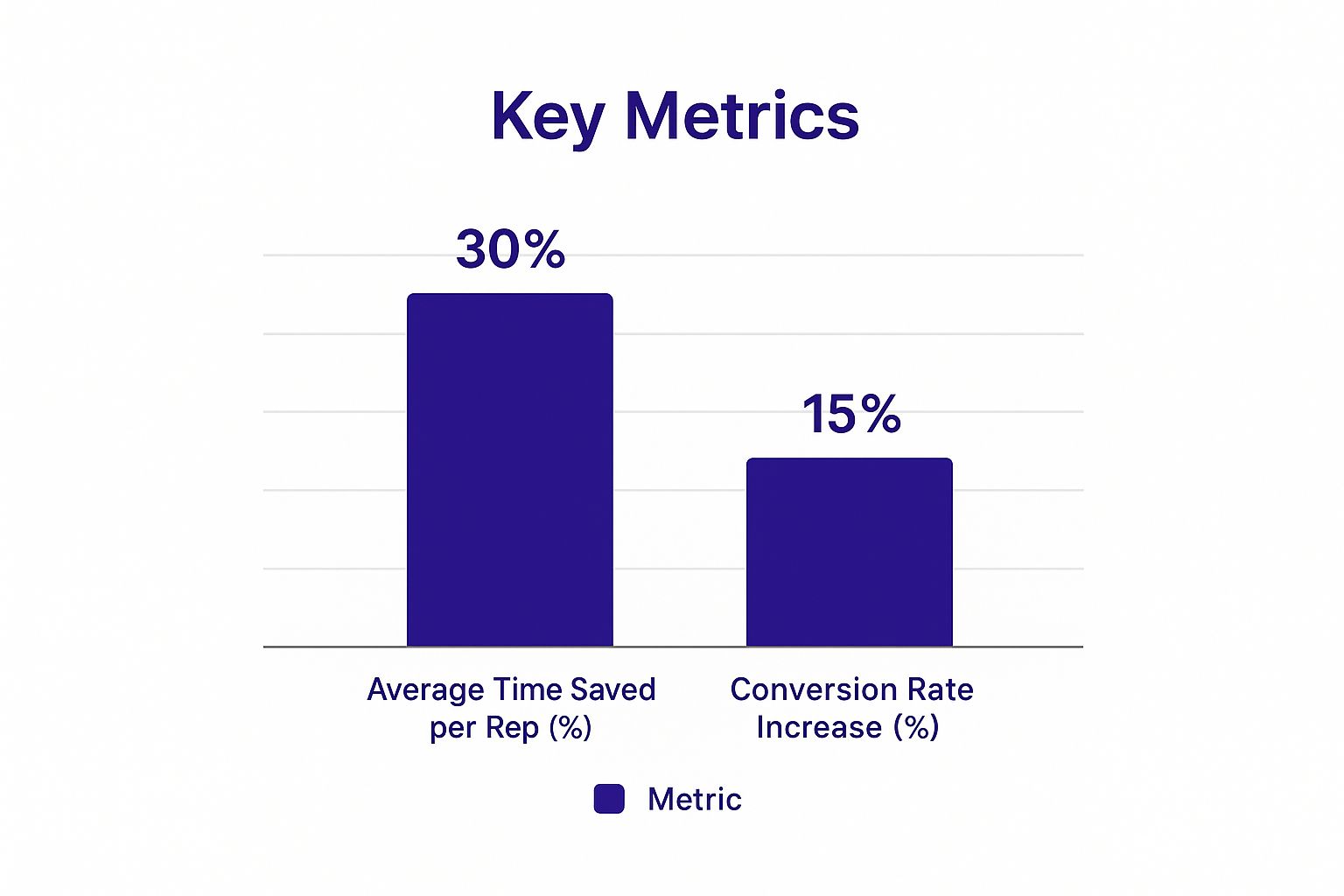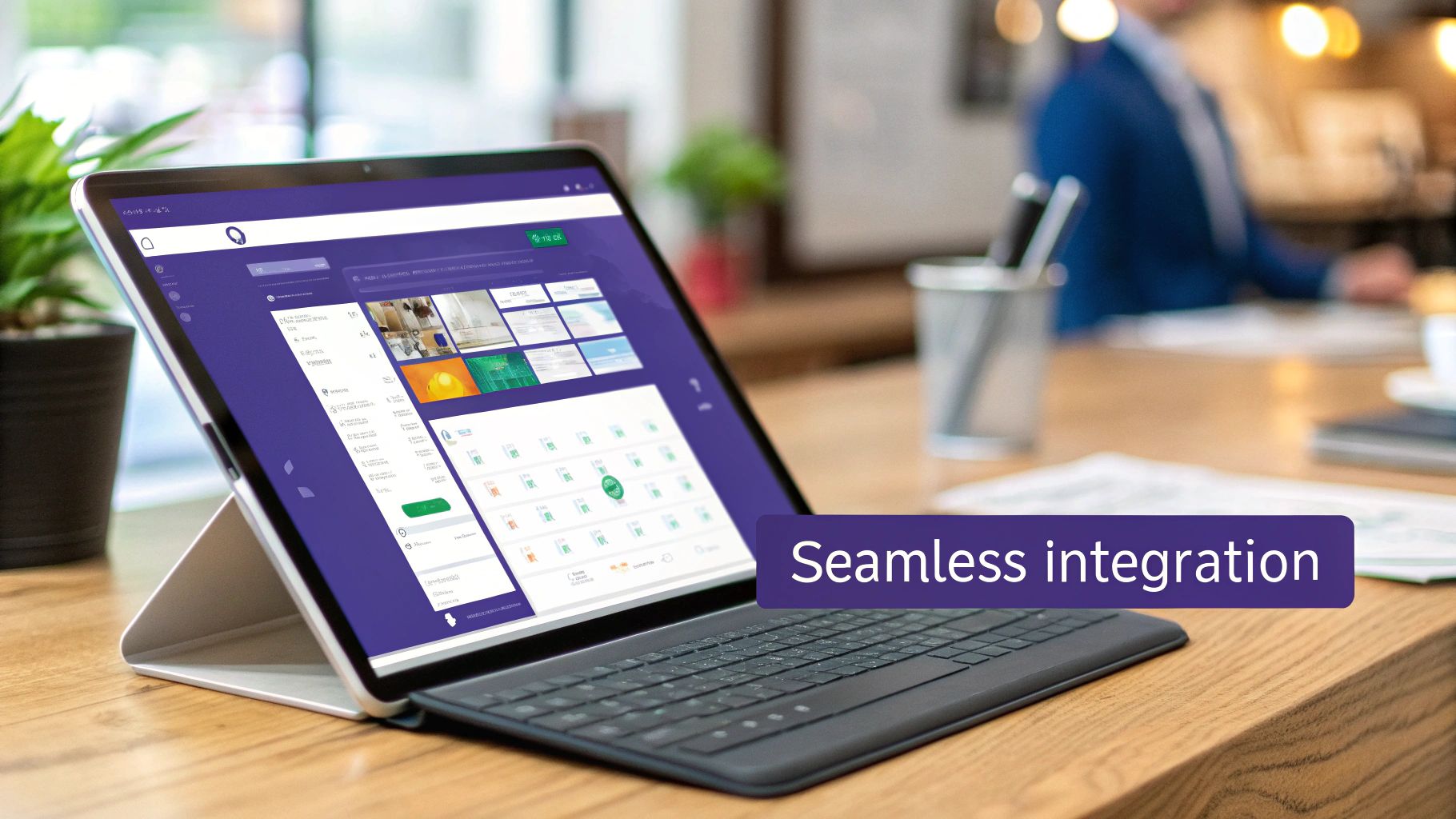Picture this: your best sales reps are freed from the drudgery of data entry and endless administrative chores. Instead, they're doing what they do best—building relationships and closing deals. This isn't some far-off dream; it's what an AI-powered sales assistant makes possible right now.
Think of it as a dedicated digital partner for every single person on your sales team. It’s designed specifically to handle the time-consuming busywork, clearing the path for your team to focus on selling.
Let's be honest, most sales teams are drowning in administrative tasks. Between updating the CRM, researching prospects, and drafting endless follow-up emails, a huge chunk of the day gets eaten up by work that doesn't actually generate revenue.
In fact, the average sales professional spends only about one-third of their time actively selling. The rest? It’s lost to non-selling activities. This is precisely where an AI-powered sales assistant steps in and changes the entire dynamic.
It's not just another automation tool; it’s an intelligent partner that takes on the repetitive, low-impact work that clogs up your sales cycle.

When you offload these cumbersome tasks, you give your team the freedom to operate at a much higher level. They stop being reactive data clerks and start becoming proactive strategists. The results are immediate and powerful.
An AI assistant doesn't replace a talented salesperson; it unleashes them. It removes the friction from their daily workflow, allowing their skills in persuasion, negotiation, and relationship-building to shine.
At the end of the day, bringing an AI-powered sales assistant on board is a direct investment in your team's productivity and your company's growth. It shifts the entire focus from just being busy to doing work that actually drives the business forward.
Let’s clear something up right away: this isn't just another chatbot or a fancy automation rule. Think of an AI-powered sales assistant as a dedicated co-pilot for your sales team, one that’s smart enough to navigate the daily grind right alongside them. It’s not a standalone app you have to check constantly; it’s a smart layer that weaves itself into the tools you already use, like your CRM and email, working quietly in the background.
To really get what makes it tick, it helps to start by understanding what an AI agent is. At its heart, this digital co-pilot uses some seriously advanced tech to think and act. It uses natural language processing to actually read and comprehend customer emails, machine learning to dig through data and flag the leads most likely to close, and even generative AI to draft personalized outreach messages that don't sound like they came from a robot.
The point isn't just to do things faster; it's about doing them smarter. A simple automation can send a follow-up email. An AI assistant, on the other hand, can suggest what to say in that email, warn you about a deal that's going cold, and take entire administrative workflows off your plate—freeing up hours in a sales rep's day.
To see just how much of a difference this makes, let’s look at how it completely reshapes a salesperson's daily routine. It’s a fundamental shift from tedious, low-value admin tasks to the high-impact, strategic work that actually closes deals.
The table below paints a pretty clear picture of this transformation.
This isn't just a nice-to-have; the results are dramatic. The market for these tools is expected to hit $20.5 billion by 2035 for a reason. Teams using them are reporting productivity boosts of up to 30% and are converting leads up to 391% faster simply by providing immediate, intelligent responses.
The proof is in the numbers, as you can see below.

It’s clear that AI assistants aren't just about making life easier. They directly contribute to a stronger pipeline and better sales outcomes across the board.
An AI-powered sales assistant isn't just one tool; it’s a whole toolkit of smart features working in concert to fix some of the oldest problems in sales. These aren't just technical specs on a feature list. Think of them as direct solutions to the real-world bottlenecks that grind your team’s productivity to a halt.
Every feature is built around a single goal: giving your reps back their most valuable resource—time. By taking over the tedious, data-heavy lifting, the AI frees them up to do what humans do best: build relationships and close deals.
Let's break down the core features that make this all possible.

We all know the drill. A new lead comes in, and the manual research begins. It's a massive time sink. An AI sales assistant puts an end to that drudgery by acting as a tireless research analyst, working 24/7.
The second a new lead hits your CRM, the assistant is already scouring the web, pulling in crucial context. It instantly transforms a simple name and email into a rich, detailed profile with everything your rep needs.
This means your reps walk into every conversation already armed with a deep understanding of the prospect’s world, all without spending a single minute on Google.
Let's be honest, not all leads are created equal. But without a smart system, it’s a guessing game trying to figure out who to call first. This is where intelligent lead scoring comes in.
Using predictive analytics, the AI looks at your historical data, customer engagement, and company details to assign a score to every single lead. It figures out who looks most like your best customers and pushes them right to the top of the list.
Your team can start their day with a crystal-clear, prioritized list of the hottest prospects. They can focus all their energy where it counts most, which has a massive impact on efficiency and, ultimately, conversion rates.
An AI-powered sales assistant essentially builds a daily "hot list" for your reps, ensuring they spend their prime selling hours talking to the people most likely to buy. This data-driven focus is a game-changer for pipeline velocity.
Everyone knows personalization gets results, but crafting a unique message for hundreds of leads is just not feasible manually. Generative AI completely changes this equation.
An AI assistant can draft hundreds of highly personalized emails in minutes. It pulls details from those enriched lead profiles—referencing a prospect's specific role, a recent company win, or a pain point common in their industry—to create outreach that feels one-to-one.
The impact is huge. Sales Development Representatives (SDRs) who used to burn 21% of their week on manual list building and CRM cleanup can get that time back. AI assistants not only auto-enrich leads but also automate the outreach, speeding up lead responses by a staggering 60%. You can learn more about how AI is boosting pipeline growth on jeeva.ai.
It’s great that an AI-powered sales assistant can automatically score leads or draft emails, but what does that actually mean for your bottom line? The real magic is how these smart tools connect day-to-day tasks directly to the results your leadership team cares about. It's about turning operational efficiency into cold, hard cash.
This isn't just about one part of the sales process, either. An AI assistant works across the entire sales funnel, almost like a force multiplier for your team. It directly impacts key performance indicators like how fast you can close a deal, your lead conversion rates, and what it costs to bring on a new customer. It’s the difference between a team that’s just busy and one that’s busy closing.
Let's walk through a real-world scenario to see this in action. Imagine a prospect named "Alex" downloads one of your whitepapers. Boom. Alex is now a new lead in your CRM. In a typical setup, Alex might sit in a digital queue for hours—or even days—before a sales rep has time to follow up.
With an AI sales assistant, the game changes completely. The process is immediate.
This smooth, fast-tracked journey means valuable leads like Alex never fall through the cracks. Every opportunity gets the attention it deserves. To get these kinds of results, it's crucial to understand how to effectively automate your sales process from start to finish.
The core benefit of an AI assistant is its ability to maintain momentum. It ensures no lead goes cold and no rep is caught unprepared, systematically turning potential interest into closed revenue.
This optimized workflow does more than just make your reps' lives easier—it delivers a serious return on investment. The numbers from businesses already using these tools tell a compelling story. A huge 80% of sales professionals say that AI assistants have directly improved their individual performance.
For example, one mid-sized company saw its lead response time get 42% faster in just the first three months. That's a metric that has a direct and proven link to higher conversion rates.
By shortening the sales cycle, the assistant helps your team close more deals in the same amount of time. It boosts conversion rates by making sure every interaction is timely and relevant. And by making every rep more productive, it lowers the cost of acquiring each new customer. These are the hard metrics that define real, sustainable business growth.
So, you're ready to bring an AI-powered sales assistant into the fold? That's a great move, but the secret to making it work isn't just about picking the tool with the most bells and whistles. Success comes from a smart, strategic rollout that actually gets your team excited and delivers real results from the get-go. A solid plan ensures the technology empowers your reps instead of just adding another confusing tool to their plate.
The whole process kicks off with a hard look at your team's specific pain points. Are you drowning in unqualified leads in HubSpot? Is your team spending half their day on mind-numbing data entry in Salesforce? Nailing down your biggest bottleneck is the first step to choosing an assistant that has the right skills and plays nicely with the software you already use.

After you’ve picked your tool, it’s time to get your house in order. An AI assistant is only as good as the data you feed it. That means your CRM data needs to be clean, consistent, and current. If you have messy or incomplete information, you'll just get bad recommendations and frustrated reps.
Think of it this way: you wouldn't ask a new hire to make sense of a chaotic, disorganized filing cabinet. You'd sort the documents first. Do the same for your data. Take some time to standardize your fields and clear out old, irrelevant contacts. This upfront work pays off massively by allowing the AI to start delivering sharp, accurate insights right away.
The most common reason AI projects fail is bad data. A clean dataset is the high-octane fuel for your new AI engine; without it, you’re not going anywhere.
Instead of unleashing the new tool on everyone at once, start with a pilot program. Pick a small, dedicated group of sales reps to take it for a spin. It's best to include a mix of your top performers and a few tech-savvy team members who are open to new things. This approach is a game-changer.
Here’s why a pilot works so well:
This phased approach keeps disruption to a minimum and builds positive momentum.
Finally, you have to nail the adoption phase. This isn't just about installing software; it's about changing daily habits. You'll likely encounter some skepticism, especially from veteran reps who have their own way of doing things.
The key is to frame the AI as a partner, not a replacement. It’s there to handle the tedious grunt work, freeing them up to do what they do best: build relationships and sell. Provide hands-on training that walks them through the exact scenarios they encounter every single day. Show them precisely how the tool saves them 15 minutes logging a call or an hour researching a new prospect.
When your team starts to see the AI-powered sales assistant as their personal productivity booster, that's when the magic happens. True collaboration begins, and you unlock the full power of the technology.
As AI becomes more ingrained in business, its role in sales is clearly shifting from a "nice-to-have" novelty to a core component of any serious sales organization. The question isn't if you should adopt AI anymore; it's how you can weave it into your sales process to truly empower your team.
This technology is growing up fast. We're moving past simple task automation and into some seriously sophisticated territory. New tools are offering AI-driven negotiation coaching, giving reps live feedback during make-or-break conversations. Others are starting to map out a customer's journey predictively, letting your team get ahead of a prospect's needs before they even know what to ask for.
Let's get one thing straight: the point of an AI-powered sales assistant isn't to replace your best people. It's to augment their skills—think of it as a co-pilot for your expert sales reps. The AI handles the routine system checks and navigation so the human expert can focus on the complex maneuvers that actually win the deal.
The goal here is to free up your reps from being task-doers and turn them into strategic advisors. When you strip away the administrative friction, they can finally dedicate their time to what they do best: building relationships, solving tough problems, and closing deals that demand a human touch.
This focus on empowering people is where the real value is, and the market growth proves it. The global AI sales assistant software market is projected to skyrocket from $2.9 billion in 2025 to a massive $20.5 billion by 2035. This surge is all about the demand for smarter, more effective sales teams. You can dig into the numbers on researchnester.com.
Ultimately, the future of sales isn't about taking people out of the picture. It's about giving them intelligent tools that amplify their unique talents. The sales leaders who get this and act on it won't just see a jump in productivity. They'll build a more strategic, successful, and genuinely happier sales force—locking in a competitive advantage that will last for years.
Any time you introduce a new tool to your sales team, especially one with "AI" in the name, questions are going to pop up. Let's tackle some of the most common ones I hear from teams exploring AI sales assistants.
Getting these concerns out in the open is the best way to make sure everyone is comfortable and ready to embrace the change.
This is usually the first question on everyone's mind. The short answer is a hard no.
The point of an AI sales assistant isn't to replace your talented salespeople, but to supercharge them. It takes over the grunt work—the tedious data entry, the back-and-forth of scheduling, the endless manual follow-ups.
This frees up your reps to do what they do best: build real relationships, handle tricky negotiations, and close those big, important deals. Think of it less as a replacement and more as giving every single person on your team their own personal assistant who never gets tired.
That's a great question. Most teams are already using some form of automation through their CRM, like email templates or task reminders. But an AI sales assistant is a whole different ballgame.
Your CRM follows rigid, pre-programmed rules. An AI assistant, on the other hand, actually thinks. It uses sophisticated AI to understand the context and intent behind a conversation.
For instance, it can read an email from a lead and understand the difference between "This price is too high" and "I'm on vacation next week." It then recommends the right next action based on that understanding, offering a level of insight that static CRM workflows just can't match.
An AI assistant doesn't just follow a script. It learns, adapts, and gives your team intelligent advice on the fly, helping them make smarter moves in the moment.
You can't just invest in a tool and hope for the best. You need to prove its worth. Measuring the return on investment is straightforward if you know what to look for.
The key is to benchmark your performance before you bring the AI assistant on board and compare it to the numbers after.
Here are the metrics that will tell the real story:
Tracking these numbers will give you a crystal-clear picture of the financial impact on your sales pipeline.
Ready to see how an AI assistant can transform your sales process? Upcraft builds intelligent agents that engage leads and book meetings automatically, freeing your team to focus on closing. Discover how it works at https://www.upcraft.ai.
Article created using Outrank
Enter your contact information and Archer will start a conversation with you via text message.